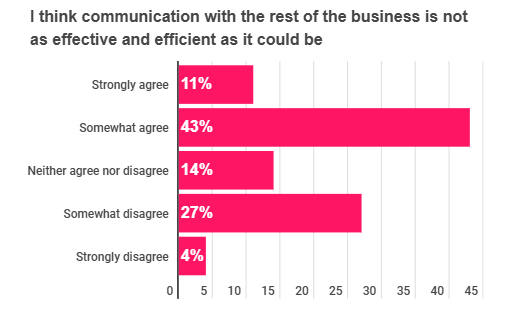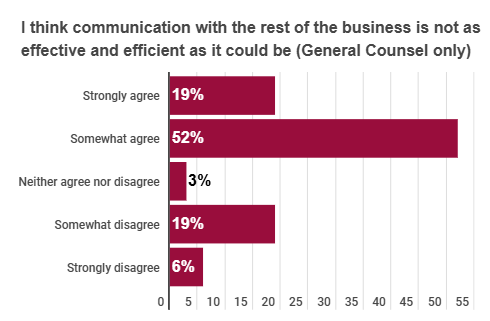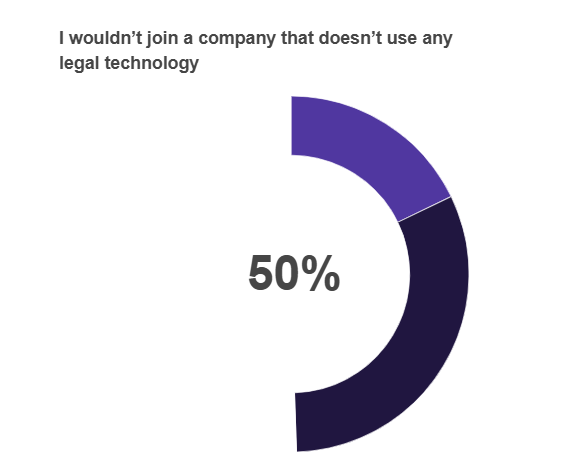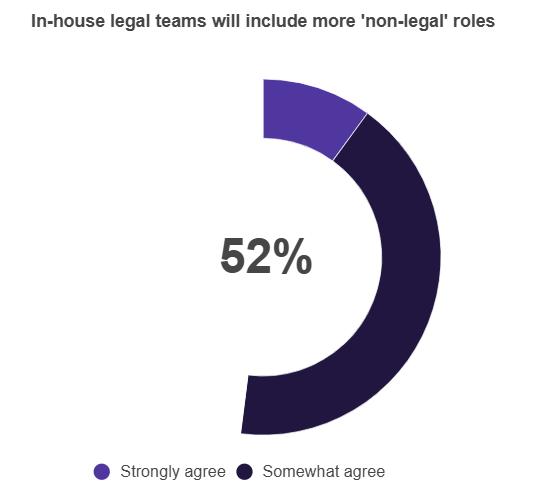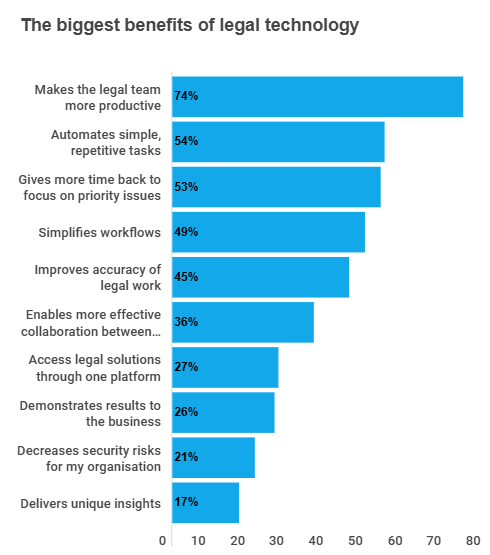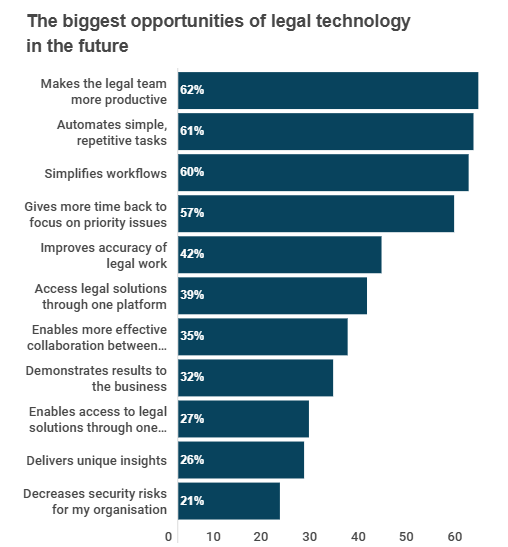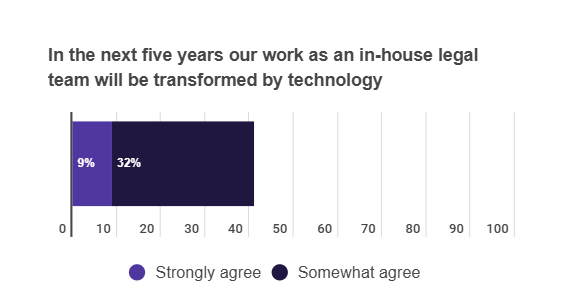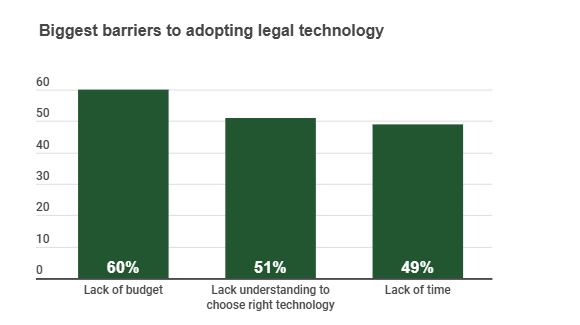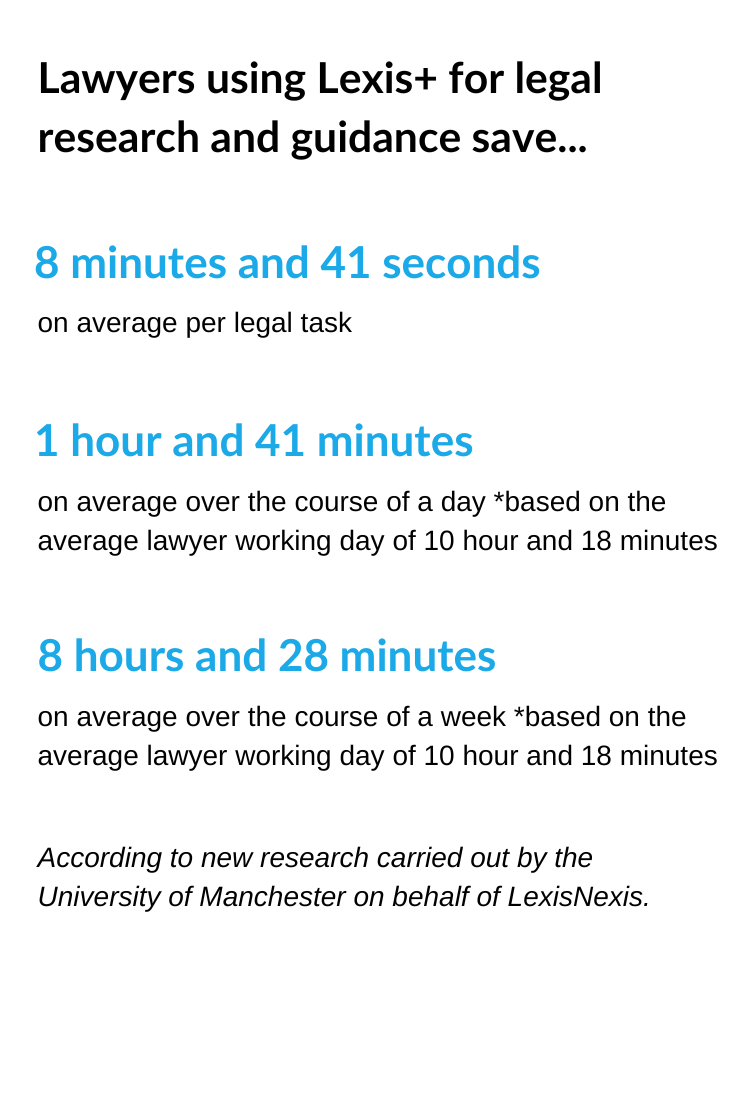Escaping the in-house legal labyrinth: using technology to demonstrate value

In-house legal counsel are under increasing pressure to deliver – and they believe legal technology is their silver bullet.
But instead of looking to innovate across the board, the focal point for many is streamlining the simple, low-level tasks so there's more time to dedicate to strategic work.
A short-term outlook means in-house legal departments risk getting stuck inside a legal labyrinth of their own making.
In this survey of 200+ in-house legal counsel we reveal how legal departments are so focused on coping with their increased workloads that they're missing out on the opportunity to demonstrate their value to the wider organisation through data insights and analytics.
Forging a new way forward
In-house legal departments are determined to prove the value they know they provide to their businesses.
In recent years, in-house legal teams have made huge strides to integrate within their wider organisations by understanding the inner-workings of each department, building trust and rapport with their leaders, aligning their goals with those of their business, and demonstrating how they can add value beyond the traditional confines of their roles.
In many ways, they've switched from being the linesmen on the sidelines to key players on the court.
But with this added responsibility comes mounting pressure to perform, and in-house teams are now being pulled in dozens of different directions.
To manage rising workloads, the majority have turned to legal technology for help, automating the routine, lower-value tasks so there's more time to dedicate to the strategic work that makes the biggest impact and best utilises their lawyers' skills.
Whilst totally understandable in these pressured times, this short-term mindset towards the use cases for legal technology is exactly what's stopping many from seeing the bigger opportunity.
In today's business world, data is the real silver bullet. Yet the survey shows very few legal counsel are interested in using data insights from their legal technology to help demonstrate and drive the value they're adding to the wider business.
Instead, they're trapped in a legal labyrinth – doomed to walk in circles without a clear way out. It is time legal departments forge a new path by looking beyond the here and now, taking their investment in legal technology to the next level and using it to showcase their real worth.
Emma Dickin
Head of In-house Practical Guidance – LexisNexis

Legal counsel risk isolating themselves from the wider business
54% of respondents said communication with the wider business could be more effective and efficient

One of the biggest fears for in-house legal counsel is being siloed from the wider organisation. If communication is poor, then their internal reputations, budgets, and place at the boardroom table could be at risk.
It's therefore not surprising to hear that, when asked about their biggest challenges, 54% of respondents said communication with the wider business could be more effective and efficient. This rose to 71% when looking at general counsel alone.
The most obvious answer to this communication conundrum is to ramp up internal exposure to the wider business. Sitting down with heads of sales, marketing, product, digital and the like to advocate the commercial value of the legal team, or setting up cross-departmental workshops or project teams to encourage collaboration.
But could this high-touch approach be what's stopping communication with the rest of the business from being as effective or efficient as it could be?
The majority of in-house legal counsel come from a private practice background, where client relationships rule, so many fall foul by treating their colleagues in the same way they would their clients.
If legal consistently demonstrates its value by meeting business needs – by showing, not telling – then legal will be invited into conversations, rather than having to elbow its way in, said Andy Cooke, the general counsel at business travel management company, TravelPerk.
"Understanding business needs requires the radical act of asking the business what its needs are, taking note of the answer and – this part is critical – not assuming that you know better."
Cooke, who previously worked as legal counsel at esports performance technology company, Fnatic, also pointed out what people want from their legal counsel.
"Answers," he said. "And they would prefer those answers to be delivered in a way that does not require a lengthy conversation with a lawyer who is operating from a misguided, high-touch view of what consumers want from their service providers. That’s where technology comes in."
A great place to start is by utilising the existing technology and tools already used by other departments within the organisation. This will mean legal teams can communicate with other teams using the same platform and the same metrics, and is likely to be a cheaper and quicker solution to implement.
Communication with the wider business is the top challenge for in-house legal teams
Almost three quarters of general counsel are concerned about communication with the wider business
In-house lawyers can no longer operate without legal technology
82% agreed demand for technology skills will increase in their legal teams

Under mounting pressure to do more with less, in-house lawyers have become increasingly reliant on legal technology to go about their day-to-day jobs. So much so that the future place of the in-house lawyer is almost inextricably linked with their legal technology – especially when looking at the many exciting opportunities generative AI brings to the table.
Being able to operate, utilise and benefit from legal technology is therefore crucial for the success of in-house lawyers both now and in the future.
We asked our respondents where they see the function of the in-house legal department in the next one to three years, and 82% agreed demand for technology skills will increase in their legal teams.
In fact, 50% of respondents to our survey said they wouldn't join a company without legal technology already in place.
Find out more about how in-house teams can create a realistic legal technology roadmap
We can see change happening when examining how many teams plan to incorporate legal technology powered roles.
When looking at the makeup of in-house legal departments, more than half of respondents (52%) said they believe teams will look to hire more non-legal roles such as project managers, data analysts or operations roles in the next few years. This is particularly evident among respondents from medium sized teams with 63% stating this to be the case (although even in small teams a significant 45% of respondents said this).
Natalie Salunke, general counsel of consumer credit provider, Zilch, said many legal counsel would be hesitant to join an organisation that doesn't have access to legal research and guidance technology.
“I want legal knowledge and precedents at my fingertips rather than having to go through a law firm. It's a really important bit of legal technology that a lot of in-house teams just expect, and if it's not going to be there, it doesn’t bode well for what that role is and how seriously it's going to be taken.”
Read practice notes on technology management for in-house legal teams
However, Salunke also points out that legal counsel should have an open mind when looking at other pieces of technology already embedded in the organisation, such as project management tools and ticketing systems.
"Don't just go for the next shiny new thing. It's important to see what your organisation already has in terms of technology solutions and see if you can leverage those as well."
Cooke, whose team at TravelPerk are trialling generative AI to upgrade their internal chatbot, also stressed how important legal technology has become in the day-to-day running of legal departments.
"Either we use workflows and technology to manage our workload, or we fail to meet the needs of the business we serve," he said, pointing out that TravelPerk signed about 25,000 documents last year.
He also highlighted how legal technology is crucial for creating happy lawyers.
"Lawyers who spend their time churning low value contracts, or who feel enslaved by the tech they use rather than empowered by it, are generally not happy," he said.
Four-fifths of respondents said technology skills will grow in importance for in-house lawyers
One in two lawyers wouldn't join a company that had no legal technology
Non-legal expertise is increasingly in demand inside legal departments
Legal technology makes more time for strategic work
74% of respondents said increasing productivity is the biggest benefit of legal technology

There's been a noticeable shift in the definitive characteristics of a skilled in-house lawyer in recent years.
As highlighted in Making the intangible, tangible: How in-house teams are approaching value creation, providing high-quality legal expertise is no longer enough. Today's in-house lawyer needs to be adding greater value by demonstrating commercial and technological acumen alongside legal expertise, and contributing to successful commercial outcomes.
These rising expectations means in-house legal leaders need to be savvy when it comes to choosing what they can deliver on and how they go about it.
It's no surprise, when looking at the most appealing benefits of legal technology, both now and in the future, that increasing productivity seems to be the inherent focal point.
'Makes the legal team more productive' was listed as the biggest benefit by respondents in our survey, with just under three-quarters (74%) selecting this as an option. 'Automates simple, repetitive tasks' (54%), 'gives more time to focus on priority issues' (53%), and 'simplifies workflows' (49%) were also popular options.
Read practice notes on the automation of contracting and contract lifecycle management
As the legal function does not typically drive revenue for most businesses, LexisNexis' Director of Strategic Markets, Mark Smith, said legal counsel need to demonstrate value in other ways.
"There's increasing views of value that lie outside the organisation," he said. "One of the biggest macro-shifts we've seen is, not just shareholder value, but a much wider societal value, which really highlights the ESG impetus on in-house counsel."
Efftichia Dower, senior legal counsel at identify tech platform, Onfido, said her business uses contract automation and outsourcing to ensure monotonous tasks are picked up elsewhere, leaving in-house lawyers to get involved in the most exciting and challenging work.
"As in-house lawyers we are true business partners and therefore can be excellent "eyes" on myriad projects across the business. In Onfido this ranges from the big-ticket commercial deals, to helping with launching new products in a frictionless way."
In-house legal counsel should be a part of the fabric of decision-making and talking through new ideas, said Salunke.
"We need to demonstrate our ability to perform, do clever things, optimising processes and getting the most out of our people. Legal advice is a given, but how we become useful and add value to our organisation is by leveraging different resources around us to get more out of them."
Increasing productivity is the top incentive to invest in legal technology
Are in-house lawyers missing the biggest opportunities in legal technology?
Only 17% of respondents listed 'delivers unique insights' as a current benefit of legal technology, while only 26% listed it as a future opportunity.

Increasing productivity is front-of-mind for in-house lawyers when thinking about legal technology – but this pressure to deliver may be stopping some from showcasing the value their team is delivering.
When asked about the biggest opportunities legal technology could deliver in the future, significantly fewer respondents (62%) listed 'makes the legal team more productive' (74% listed it as a current benefit). This suggests a commonly shared belief that the opportunity to increase productivity through legal technology has already been capitalised on – rather than as an opportunity for future growth.
The biggest opportunities of legal technology, to a great many, means clearing their desks of the simple, repetitive, routine work through the use of document automation, contract management and workflow tools. When asked about the future benefits of legal technology, 61% of survey respondents listed 'automates simple, repetitive tasks' (54% listed it as a current benefit) and 60% listed 'simplifies workflows' (49% listed it as a current benefit).
However, a mere 17% of respondents listed 'delivers unique insights' as a current benefit of legal technology, while only 26% listed it as a future opportunity.
This is a stark contrast from the 84% of respondents from our 2020 survey of in-house lawyers who said legal technology must have the ability to surface data insights in the next three to five years.
Data insights can enable in-house teams to plan ahead, pinpoint growth opportunities, spot trends and risks, and better collaborate with other departments. It could even be the answer to in-house legal counsel's biggest challenge – communicating with the wider organisation.
In a similar vein, only 26% of respondents listed 'demonstrates results to the business' as a wider benefit and 32% listed it as an opportunity for the future.
You would think, at a time where in-house lawyers are being pulled in dozens of different directions that stray outside their traditional remit, that more respondents would recognise legal technology for its opportunity to demonstrate value.
In recent years we've seen in-house lawyers make the transition from the traditional "T" shaped lawyer (an expert in a particular field) to the "O" shaped lawyer (looking at opportunities and outcomes).
According to Dower, the very best in-house teams are now data-driven.
"The only way that this can be achieved is with legal design and legal operations. The variety of work an in-house lawyer has to do hasn't changed, but the way that we can record and present data to demonstrate the key work that legal is doing has taken huge strides," she said.
"There is no better way to be a business partner than showcasing that data to the executive team and allowing them to understand the changes and efficiencies the legal team are driving."
For the in-house legal teams that lack the time to implement workflows to manage the repetitive work, Cooke has some suggestions.
"Lawyers in this situation must understand that no-one is coming to save them. Absent intervention, the problem will get worse – the benchmark response time for lawyers to a query is now “how quickly can ChatGPT give me the answer”".
This raises an interesting point in terms of risk, especially if other departments start using ChatGPT for legal advice instead of consulting their legal team.
To get ahead, Cooke suggests in-house legal leaders understand what exactly their teams are doing (and if there's anything they shouldn’t be doing), the tools they have at their disposal (such as ticketing systems to use for managing legal workflow), and internal and external headcount.
"It's critical to recognise that lots of traditionally-conceived legal tasks, like reviewing simple agreements, do not need a lawyer to complete them," he said.
Only two-fifths believe legal technology will transform their departments (although the emergence of ChatGPT is likely to have changed this)
Budgets are the biggest blocker
60% of respondents cited 'lack of budget' as a barrier to legal technology adoption

One of the biggest obstacles to the adoption of legal technology is cost, with almost two thirds (60%) citing 'lack of budget' as a barrier.
In recent years, in-house legal departments have come under pressure to reduce costs – and this problem won't be going away any time soon. When we asked our respondents if they believe their department's technology budget will grow in the next 12 months, only one in five (20%) agreed or strongly agreed.
With the internal reputations of in-house legal counsel gaining significant momentum, it seems a shame that many are being held back from demonstrating further value due to budgetary concerns.
Yet, if you had to choose any profession to rely on for their powers of persuasion, would it not be the legal profession?
The commercial opportunity here to drive real change in today's business environment is huge – legal leaders need to identify ways of powering this.
Salunke said in-house legal teams, like any other business function in an organisation, are expected to do smart things with their budgets and put business cases together to try and be more efficient.
However, she also believes legal technology has become more affordable for in-house teams in the last few years.
"Now everything's moving to dynamic SaaS and I think the pricing tiers, or the way that these organisations price, is much more fitting to smaller legal teams and in-house teams. I think that's one of the reasons why we're probably buying direct rather than through law firms."
Final thoughts
To escape the legal labyrinth, in-house teams need to be constantly innovating

Technology has come on in leaps and bounds over the last year or so – and new tools, functionalities and capabilities are being developed at breakneck speed.
While in-house legal departments have made huge strides in the legal technology and innovation space, their rapidly expanding workloads means there is a risk of inertia.
Just look at how in-house lawyers currently view legal technology – their focus is on using it to automate low-level, repetitive tasks to free up more time for strategic work. However, focusing on the broader potential of technology and finding different ways to demonstrate value will help legal teams to better illustrate their worth and overcome communication challenges.
To escape the legal labyrinth, in-house teams need to be constantly innovating. That means reviewing existing suppliers, harnessing the technology already in play in their organisations and being savvy about new investments by partnering with technology companies that have roadmaps spanning well beyond the realms of what we see in today's legal market.
